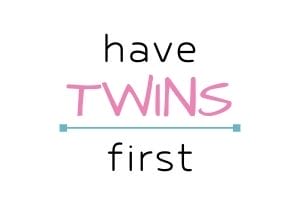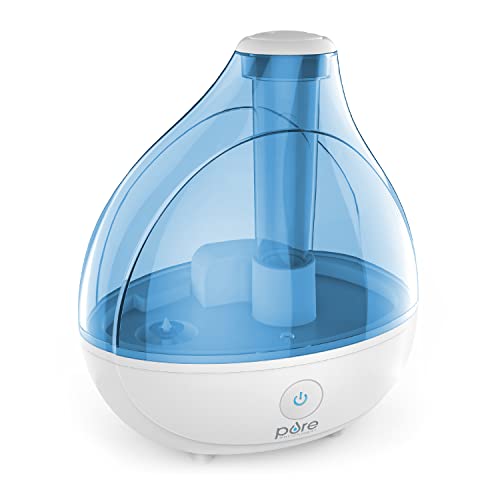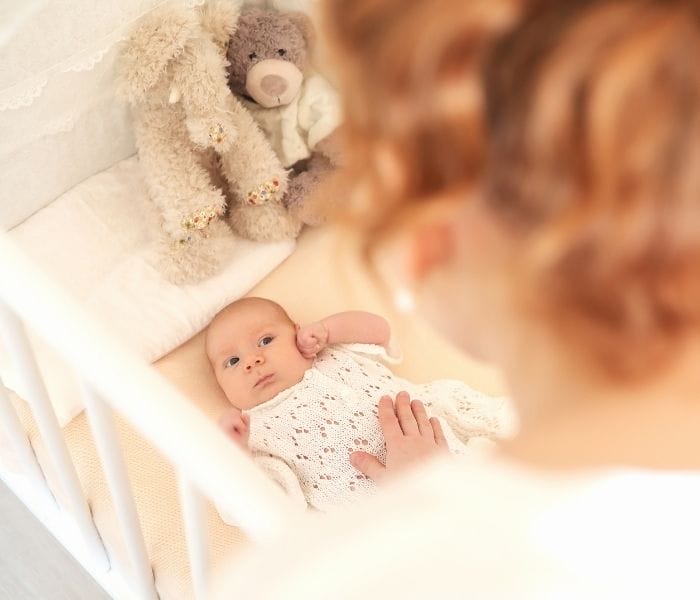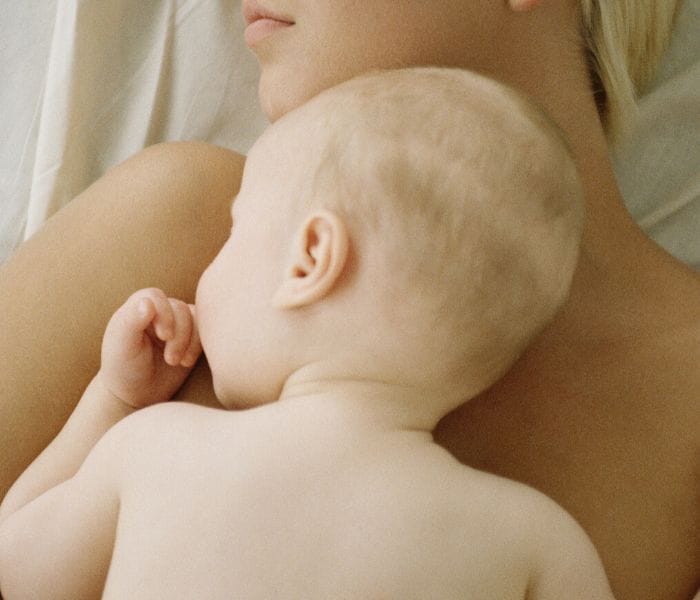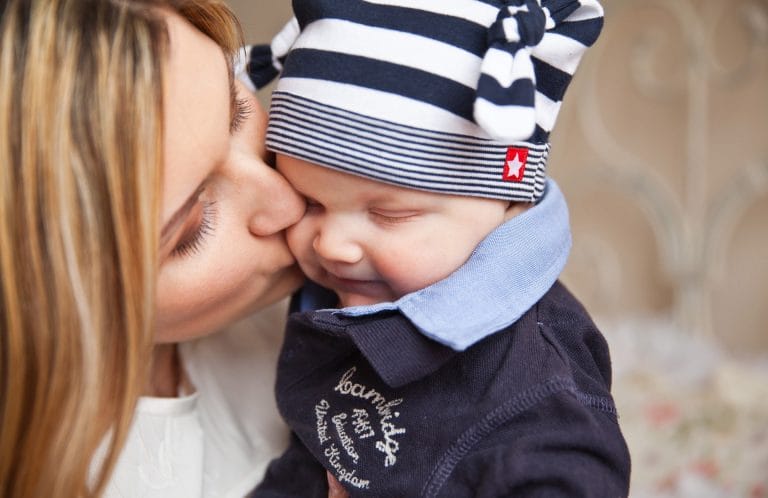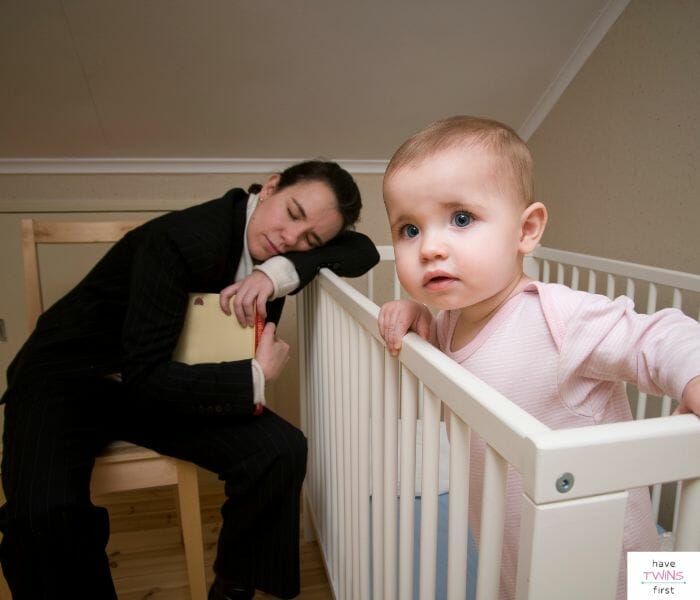When your little one falls ill, it can be a challenging time for both parent and child. As a parent who has embraced sleep training, you might find yourself torn between maintaining your sleep routine and providing the extra care your sick baby needs. A question that might arise:
Should you stop sleep training when your baby is sick?
This question delves into the considerations parents face when navigating sleep training during their infant’s illness. In this article we will explore the impact sleep training has on recovery from sickness, the comfort of your baby, and tips to help a sick baby sleep. With this information, you will be able to make an informed decision that balances both your baby’s health and sleep habits.
Please note, there are affiliate links in this post. Read my privacy & disclosure policy at the bottom of this page to learn more.
Should You Stop Sleep Training When Your Baby Is Sick?
When your child is sick it is natural that your priority is her health and wellbeing. However, if you have been sleep training your child, you may be uncertain as to whether you should carry on with the process or pause temporarily during the illness.
There is no one solution that works in every circumstance. But, there are several things to consider before temporarily discontinuing sleep training.
It’s crucial to understand that an infant’s sleep will be disturbed when ill. Trying to continue sleep training while your baby is sick could actually hinder recovery. Sleep training often involves letting babies soothe themselves to sleep, but that might not be possible when they’re unwell.
Your baby needs more cuddles, comfort, or even medical attention during the night, which can interrupt progress with sleep training. You can provide your baby with the additional care and attention required to recover by temporarily pausing sleep training.
The emotional health of both you and your child must be taken into account. Seeing your child unwell can be upsetting.
Having to follow a sleep training schedule might make an already challenging situation even more stressful. By pausing the sleep training process, you can concentrate on showing your infant affection, solace, and assurance while fostering a safe and supportive atmosphere for healing.
Keep in mind that halting your sleep training program doesn’t imply you’re giving up on it altogether. You can gradually reinstate a sleep training routine when your infant is feeling better.
Regaining any previous progress may take some time. However, all will not be lost and once your little one is fully recovered, you will find that the process will go smoother.
How Long Should You Stop Sleep Training When Your Baby Is Sick?
Balancing the needs of your baby’s health and maintaining a consistent sleep routine can be challenging. There is no definitive answer as to how long to stop sleep training when your baby is sick. There are several factors to consider that can guide your decision.
The duration of the pause in sleep training depends on the severity and duration of your baby’s illness. If your baby has a mild illness, such as a cold or a minor infection, you may only need to pause sleep training for a few days. In such cases, focusing on providing comfort, soothing, and ensuring rest can help promote a speedy recovery.
For more serious illnesses or prolonged periods of sickness, you may need to extend the pause in sleep training. This allows you to prioritize your baby’s health and well-being without putting unnecessary stress on her. It’s important to consult with your pediatrician or healthcare provider for guidance on the appropriate duration of the pause based on your baby’s specific condition.
Observe your baby’s progress in recovering from her illness. Once she starts to show signs of improvement, such as decreased discomfort or reliable sleep patterns, you can gradually reintroduce sleep training. Be mindful that it may take some time for your baby to readjust and regain previous sleep training progress.
Remember, the ultimate goal is to provide the best care for your baby while also respecting her individual needs. Every baby is different, and what works for one may not work for another. By being attentive to your baby’s cues and seeking medical advice when necessary, you can determine the appropriate length of time to pause sleep training and resume it when your baby is ready.
Why Is It Important To Stop Sleep Training When a Baby Is Sick?
You may be wondering why it is important to stop sleep training when a baby is sick, especially when it is definitely not the easiest thing to do in the first place. One big reason is that when a baby is sick, she is not going to be able to self-soothe because she does not feel well enough and needs more comfort.
In general, a baby that is sick struggles to sleep. Even though you may feel like all your sleep training progress is lost during the time that your infant is recovering, you will be surprised how quickly your baby will be able to snap right back into a routine when she is well again.
Having little ones try to calm themselves when they do not necessarily know what is even happening (sore ears, throats, etc.), and they cannot communicate their discomfort can be traumatizing in the long run. It can potentially harm sleep training in its entirety.
Take some time to be with your sick baby. Let her rest how she needs to, and give her the comfort needed to fully recover from whatever illness she is suffering from.
How To Get a Sick Baby To Sleep
Getting a sick infant to sleep can be a challenge. When children are ill their sleep patterns may be disturbed, which can cause agitation and pain.
Below we are sharing some ways that may help you soothe and calm sick babies while trying to get them to sleep the best that they can. After all sleep is the best medicine (along with cuddles from mommy and daddy).
Comfort Your Baby
Babies love to be held, snuggled, and cuddled at the best of times, and when they are sick they need it even more. Being available, rocking, singing, or speaking softly to your baby can be an incredible dose of healing power.
Comforting your baby is something that can really make a difference in the recovery process. Your calmness can help your little one to relax and be soothed.
Use a Humidifier
In my opinion, a humidifier is something you should have in your home regardless of illness or not. It is such a great investment and comes in handy.
Why are humidifiers so useful? They add moisture to the air, so they are very effective in helping people feel relief if they are congested and suffering from a sore throat. The moisture also helps to loosen up mucus build-up in noses and sinuses.
Breastfeed (If Possible)
Breastfeeding is one of the best ways to help your baby feel better faster. Not only are the antibodies found in your breastmilk extremely effective in healing and eradicating illness in your baby, breastfeeding is also be a great source of comfort for an infant.
Babies feel soothed, nourished, and loved all at the same time! In addition, when your baby is breastfeeding it can actually assist in loosening up mucus and relieve congestion. Finally, breastmilk is also a great source of hydration.
Use a Nasal Aspirator
Do you have a nasal aspirator? If not run and get one now. If you’ve read my baby registry checklist post, you know that I consider this a super handy item to have.
These little devices are incredible. Fair warning though, they may not be the most fun to use and your baby will not be pleased (in the moment), but they are worth it to get your baby breathing better.
There are various types of nasal aspirators available and these include:
- Oral Suction (pictured above) – This is not for the faint-hearted, but is probably the most effective. It involves the use of a tube attached to a syringe-type item which is inserted into the nostril. You suck out the mucus on the other end. It has filters making it hygienic and safe.
- Bulb Syringe – Possibly the easiest and most widely used is the little bulb suction tool. One end is inserted into the baby’s nostril and uses suction out with the bulb end. You might have even brought one of these home from the hospital after giving birth.
- Electric Aspirator – Get this if you want to spend a little more money for convenience. It is a device that is battery-operated and is very effective in removing mucus quickly.
A congested baby is not going to sleep well, so investing in an aspirator will be very beneficial to you and your little one.
Keep Baby Hydrated
A dehydrated baby is going to feel very unwell and uncomfortable, which in turn means no sleep to be had. Make sure your baby drinks as much fluid as possible because that will help with soothing sore or irritated throats.
It will also help if your child is experiencing headaches or body aches. Breastmilk is first prize or baby formula. If your baby is older than 6 months then you can offer water too.
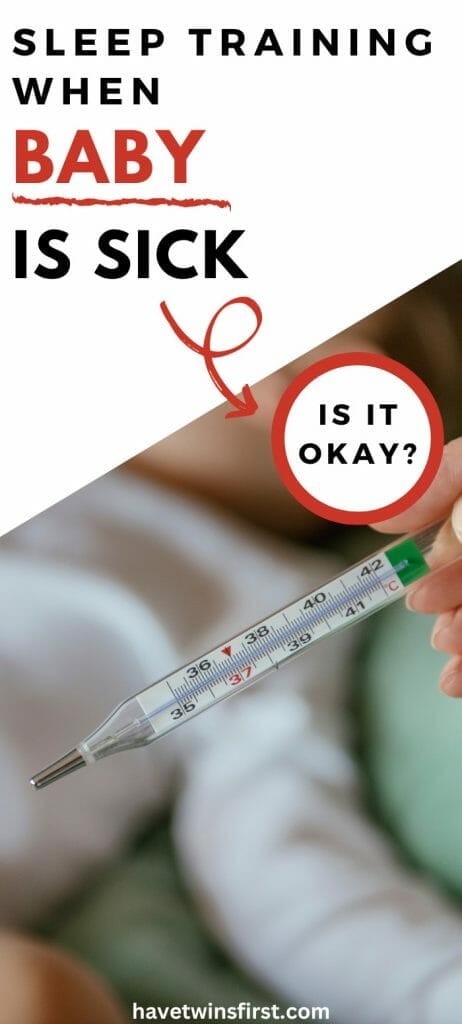
What Should I Do If My Sick Baby Is Sleeping All Day?
If you have a baby that is sick, she might be sleeping a lot more. Her awake time will be shorter, and this is perfectly normal.
Sleeping helps babies to heal and recover (just like adults). In fact you want them to sleep as much as possible because a tired, sick baby is no fun for anyone.
If your baby has gone down for a nap and you usually wake him or her up after 2 hours, don’t do that during sickness. Let your child wake up when ready. More rest is needed to fight off infections, so the extra sleep will help.
If your baby is only able to stay awake for an hour and is constantly drowsy and groggy during wake times, it may be a good idea to mention that to your physician. Other than that, let your little one rest as much as possible (and get rest for yourself too).
How To Start Sleep Training Again When Your Baby Is No Longer Sick
Once your baby has recovered from his or her illness, you may be eager to resume sleep training and establish healthy sleep habits. However, it’s important to not make sleep training mistakes, and approach this transition gradually and with sensitivity to your baby’s needs. Here are some steps to consider when starting sleep training again after your baby is no longer sick.
- Assess your baby’s readiness. Ensure your baby is fully recovered and displaying signs of improved health and energy levels. It’s essential to prioritize their well-being before reintroducing a structured sleep routine.
- Gradually reintroduce sleep training techniques that you were using before the illness. Start by reinforcing a consistent bedtime routine to signal to your baby that it’s time to sleep. Be patient and understanding, as your baby may take some time to readjust.
- Provide extra comfort and reassurance during the transition period. Your baby may have experienced a disruption in sleep routine due to illness. Offering additional soothing and attention can help him or her to feel secure.
- Monitor your baby’s responses and adapt your approach as needed. Each baby is unique. Be flexible and responsive to your little one’s individual sleep needs.
Remember reestablishing sleep training after an illness may require some patience and persistence. Stay consistent and provide a nurturing environment for your baby to develop healthy sleep habits once again.
Related reading >> How Long Does Sleep Training Take?
Sleep training when your baby is sick is not worth it.
It may seem like the world is ending when you have to stop sleep training progress, especially when you may have put in quite a lot of work already. But, do not force the issue when your baby is sick.
Sick babies need comfort, soothing, and as much rest as possible. The best approach to the situation is to give yourself a break, be with your child, feed your baby, and keep him or her hydrated. Make sure that any necessary medication is administered when it needs to be.
There is plenty of time to resume your sleep training once your baby has recovered from the illness. Good luck and remember the old saying: “This too shall pass.”
Finally, one more thing before I sign off. If you’ve read all this and realize that once your baby is better you need more guidance on how to go about sleep training, then I have you covered. Definitely check out the Baby D.R.E.A.M. System created by a mom and pediatric sleep consultant to help struggling parents .
If your baby’s sleep is a huge struggle, put a stop to it ASAP. Get this simple 4-step program that will get your baby sleeping through the night AND napping.
